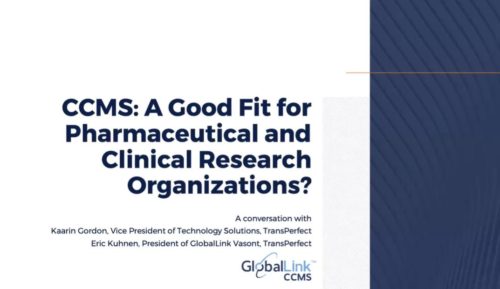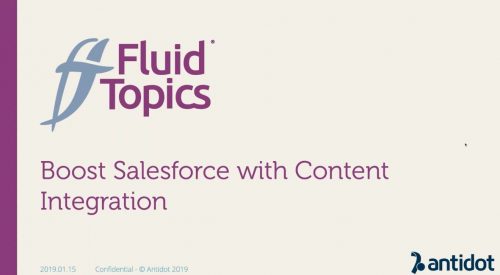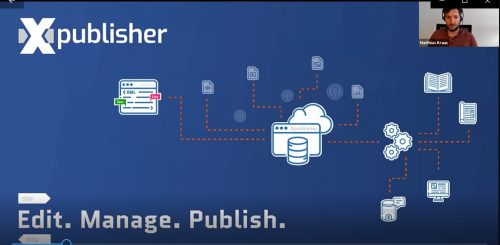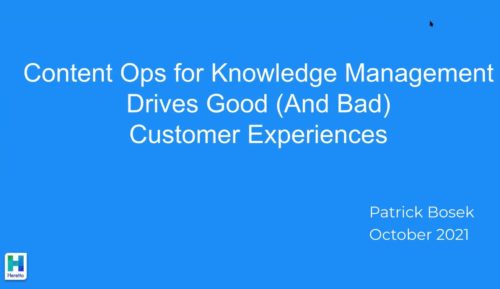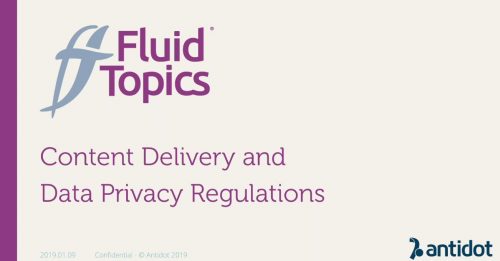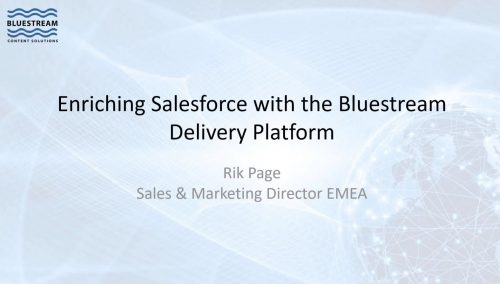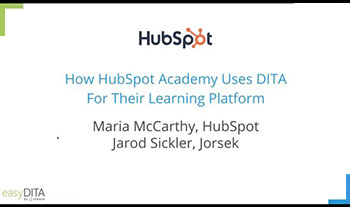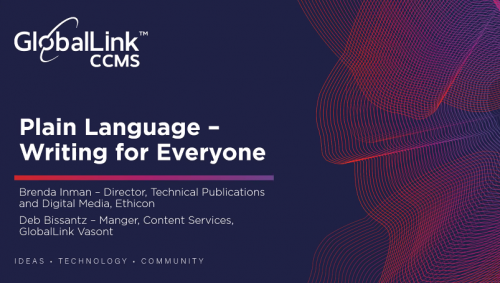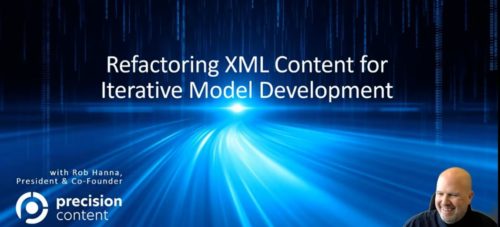- Provide your audience with content that is accurate and compliant
- Align your global workforce with One Voice
- Accelerate your time to market thanks to less time for review and editing
- Reduce your source content and translations by 40%
- Show industry credibility by complying with industry standards to help open new markets
-
December 14, 2021 Attend this webinar if you’re looking to:
-
December 8, 2021 Kaarin Gordon discusses the choices and challenges for efficient content reuse facing Pharmaceutical and Clinical Research Organizations. What they want is a set of tools and platforms for easy content reuse, automatic propagation of changes from a single source, and content governance. What they have is Microsoft Word; it’s easy to use but limited to cut-n-paste content reuse. What they must deliver is multi-lingual content for a variety of uses – faster, more cost-effectively, and at lower risk. Join Eric Kuhnen in conversation with Kaarin Gordon for an engaging discussion of how component content management systems amplify or ameliorate some of the difficult content complexities that organizations face today. Presented by: As the Vice President of Life Sciences Technology Solutions at TransPerfect, Kaarin Gordon works closely with organizations on solutions to more effectively develop, manage, translate, and deliver multilingual content. She has spent 20+ years working with pharma, CROs, and medical device companies and focused on developing and implementing solutions that address global content challenges and result in decreased cycle time, reduced risk, increased consistency, and lower costs. Kaarin has a BA from the University of Michigan and an MBA from Columbia University. Eric Kuhnen is the President of GlobalLink Vasont, one of TransPerfect’s GlobalLink CCMS solutions. He has more than 30 years of experience in product research, development, and management. Prior to his current role, managed global operations, product management, pre-sales, and marketing for Astoria Software, a division of TransPerfect, Inc. He has also held profit-loss responsibilities with GoRemote and Oracle Corporation. He has a Bachelor of Science degree in Computer Science from Brigham Young University.
-
February 15, 2022 Just putting your technical documentation on your webpage as a PDF for download will not make you a content hero. PDF is a given – a fundamental requirement. However, both business leaders and end customers expect more than just a documentation portal or a well-designed PDF. They want contextually relevant, personalized, consistent, conversational, and scalable content experiences. But how to deliver on this expectation? In this session, Stefan Gentz, Senior Worldwide Evangelist for Technical Communication at Adobe, will share some insights from the recent Adobe-commissioned Forrester study. Forrester surveyed 450 decision-makers on Content Experience Management to understand how global brands deliver relevant and contextual experiences across touchpoints. He will explore the design of positive customer journeys from marketing to technical support and self-service and back to sales – experiences that provide 360° content experience for your customers and handhold them across their whole content journey. Presented by: Stefan’s mission is to inspire enterprises and technical writers around the world and show how to create compelling technical communication content with the Adobe Technical Communication tools. He is also a certified Quality Management Professional (TÜV), ISO 9001 / EN 15038 auditor, ISO 31000 Risk Management expert, and Six Sigma Champion. As a sought-after keynote speaker and moderator at conferences around the world, he travels around the globe half of the year. Besides that, he has been the European Ambassador for the Globalization and Localization Association (GALA) for many years, a member of the tekom Conference Advisory Board for several years, and is now a member of the tekom iiRDS working group for Intelligent Information and member of the OASIS DITA Adoption Committee. In 2016, Stefan Gentz was awarded by MindTouch as one of the Top 25 Leading Content Strategist Influencers in the world and as one of the Top 25 Content Experience Influencers in the world in 2017. Stefan Gentz on LinkedIn Stefan Gentz on XING @stefangentz on Twitter www.adobe.com
-
February 6, 2019 With Salesforce supporting many customer-centric processes, it must be able to leverage the technical documentation that’s needed to increase efficiency of these processes. And yet, despite being built around a comprehensive and extensible data model, Salesforce is not equipped for storing and delivering technical content. So what should you do when you are asked to integrate tech doc inside Salesforce? Fortunately, options are available for solving this challenge and making relevant technical content available to support staff and customers. Presented by: Fabrice Lacroix is a known Web pioneer and the founder of Antidot, the company that puts enterprise content to work. As an entrepreneur, he has been working for 25 years on the development of the Internet and of the Web through several major companies.
-
March 17, 2021 Xeditor is a professional online XML editor based on state-of-the-art web standards. With Xeditor, structured, semantically correct content in XML format can be created intuitively, efficiently and without technical knowledge. By enabling authors to work together on structured content from any location at any time, Xeditor helps companies put efficient workflows in place. This way, companies are able to take advantage of all the benefits of standardized content - such as automated further processing - without the need for costly training for authors. Presented by: Matthias Kraus is the founder and managing director of Xpublisher GmbH. Since 2001, he has been advising numerous leading international companies and organizations from the aerospace, technology, education, publishing, public administration and many other industries in the field of multi-channel publishing and accompanying them on their way to digitization.
-
October 6, 2021 Our content shapes experiences and drives behavior. The question then becomes, is your content causing positive or negative experiences and behaviors? In this presentation, we’ll take a critical look at content operations (Content Ops), the processes behind your knowledge, and how they make or break customer experiences. You’ll learn:
- Tactics to turn your haphazard workflow into a repeatable process
- Overlooked signs that your content hinders customer experience
- How to ensure your content capability can scale with your company’s growth
-
January 12, 2022 Moving to structured authoring and implementing a CMS are critical projects that will generate long-term efficiency gains and significant savings. But before you get there, there are great hurdles to overcome. First and foremost, there's winning budget approval from your execs, who will have a singular focus on risk and ROI. Second, you need to maintain a high level of commitment and buy-in from those executives over the years that re-engineering of content production can last. Too many content restructuring projects fail or don’t even start because they cannot demonstrate a quick and tangible return on investment - and this is where Dynamic Content Delivery changes the game. Dynamic Content Delivery provides outstanding content experiences to your users and creates immediate value for your company without requiring a big bang in your writing process. It earns you internal support, money, and time you can leverage to optimize your content restructuring process. In this webinar, you will learn:
- How Dynamic Content Delivery generates value from your existing content, no matter the writing tools and methods you are using now
- How to achieve quick wins and build a fast ROI to gain support from your Execs for your content project
- How to optimize your project to move to structured authoring and make it a success
-
January 9, 2019 New privacy regulations (EU’s GDPR, US’s Privacy Shield, and others) are introducing a regime of strict consumer protections. Companies will have to comply with: requiring opt-in to data gathering, rather than opt-out; enhanced protection measures; data protection officers; transparency about data breaches; and many others. We will review the constraints imposed by these regulations, what they mean in terms of content delivery platforms, and how enterprises can meet them and compete successfully in lucrative growing markets. Presented by: Fabrice Lacroix is a known Web pioneer and the founder of Antidot, the company that puts enterprise content to work. As an entrepreneur, he has been working for 25 years on the development of the Internet and of the Web through several major companies.
-
April 11, 2019 Salesforce is ubiquitous. It is being used to drive self-service portals, support internal staff, increase sales, and much more. However, Salesforce can now be made more powerful and give you even greater competitive advantage. Whether you are using Sales Cloud, Service Cloud, Marketing Cloud, or Community Cloud, you are sharing your information. Bluestream will show how you can help your customers to easily find great support information through community searches, right beside your community forums, blog posts, and Salesforce KB articles. Dynamically update content through Bluestream’s end-to-end solution. Use XDocs’ sophisticated tags to customize information based on user profiles, permissions, and languages, and deliver customer- and configuration-specific documents, policies, or procedures. Presenter: Rik Page is Sales and Marketing Director at Bluestream Software and has been working with both component content and document management solutions since 2001. During this time he has worked with custom DTDs and Schemas, S1000D, iSpec2200 and DITA. His experience covers a wide range of industries including education, banking and finance, manufacturing and healthcare. A keen advocate of technology and innovation Rik has taken part in multiple consultancy projects and helped formulate solutions all over the world.
-
November 18, 2020 Learn how HubSpot Academy, the world’s leader in providing inbound sales, marketing and customer service education, adopted DITA to help solve their content creation, conversion and output needs. HubSpot’s use case is exciting and unique as it pushes the boundaries of what we typically associate with DITA. Rather than producing typical technical documentation, HubSpot is using DITA to produce:
- Complete lessons, courses, and certifications
- Learning assessments
- Powerpoint outputs
- And localizing that content in five languages
-
April 21, 2021 The Plain Writing Act of 2010 requires federal agencies to follow plain language guidelines for government documentation. In addition, Section 508 standards require all information and communications technology to be accessible to disabled users. Besides meeting these requirements, are there other advantages for technical writers who use plain language? Yes, there are! Brenda Inman and Deb Bissantz will explore examples of overly verbose information that can be written using plain language to convey the information more clearly. While exploring these examples, Brenda and Deb will also share benefits, guidelines, and tips for using plain language. What can the audience expect to learn? Attendees will learn to recognize opportunities for using plain language, such as when to use a $0.50 word instead of a $5.00 word. Attendees will also learn tips for writing clear, concise information using plain language. Presented by: Deb Bissantz is a Content Services manager for GlobalLink CCMS. Deb’s mission is to partner with organizations to make the most of their DITA and component content management solutions. Before joining GlobalLink CCMS, Deb worked with and authored DITA content for many years. As a writer and tools administrator, she helped several organizations migrate technical documentation to DITA and to a CCMS. Deb is a voting member of the DITA Technical Committee. Brenda Inman is the Director of Technical Publications for Robotics and Digital Solutions at Ethicon, part of the Johnson & Johnson family of companies. Brenda has worked in the medical device her entire career mostly within technical publications and localization and also has experience in clinical research and regulatory affairs. Brenda’s experience within technical publications and localization includes writing user manual content, implementation of content management systems, and setting up best practices for writing and localization.
-
December 1, 2021 Developing robust content models can never be a once-and-done endeavor where IAs are required to incorporate all aspects into the design prior to authoring. Instead, an iterative approach is needed to allow for incremental improvements not just during setup but long into production. Join Precision Content’s President and Chief Information Architect, Rob Hanna, to explore methods the company uses to refine models and update the content corpus through scheduled refactoring activities. Presented by: Rob Hanna is an award-winning technical writer and content strategist and an industry leading expert in structured XML authoring, DITA, and content management. In 2014, Rob was awarded the rank of Fellow of the Society for Technical Communication (STC) and earned the Enterprise Content Management Specialist (ECMs) designation from AIIM. In 2017, he was named one of the top 25 global leaders in content experience strategy by Mind Touch. He founded Precision Content in 2013 after nearly 20 years in the industry as a technical writer, information architect, knowledge management specialist, and taxonomy expert. In 2018, Precision Content joined Google, Adobe, and Acrolinx on the list of "Top 100 Companies that Matter Most in Digital Content Industry" by EContent Magazine. See http://www.linkedin.com/in/singlesourceror for more information.


